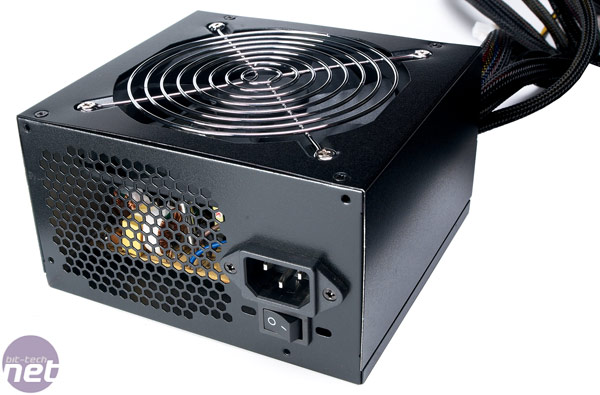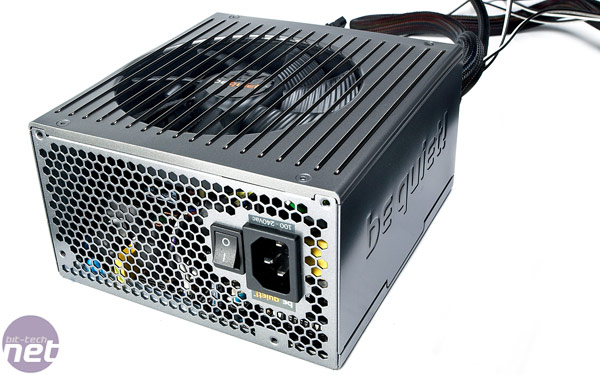600 - 700W PSU Review Round-Up
February 22, 2010 | 09:49
Companies: #akasa #antec #be-quiet #bit-tech #enermax #seasonic #silverstone #tagan #thermaltake #xfx

Generic 600W
Manufacturer: VariousUK Price (as Reviewed): Around £22 (inc. VAT)
US Price (as Reviewed): Around $35 (ex. Tax)
In addition to all the branded PSUs we looked at, we also wanted to take a look at a generic unbranded PSU that’s typical of those sold in small independent PC shops, or which is labelled as the house brand by large etailers. Since these generic PSUs typically sell for such low prices (in this case, £22 compared to £59-£115 for a branded PSU), they’re an attractive purchase for uninformed buyers.
Testing didn’t start off well for our generic 600W PSU, as it would appear that the manufacturer can’t perform basic maths. According to the sticker on the side of the PSU, the maximum combined output of the rails is 547.6W, meaning that even on paper, this isn’t a 600W PSU. Trading standards anybody?
Our 600W generic PSU is also under-equipped, with only a single PCI-E connector (6-pin), two SATA, four Molex and one FDD. In addition, there’s no 8-pin EPS12V connector, only a 4-pin ATX12V, so many motherboards won’t even POST with this PSU in the driving seat.
At 50 per cent load (just 300W), the generic PSU provided a stable voltage from its 3.3V, 5V, -12V and 5VSB rails. However, the 12V rail failed dismally to output the minimum 11.4V required by the ATX specification, instead pushing out a feeble 11.03V, which would cause most circuits to fail and your PC to crash. The PFC circuit was an abysmal 53 per cent efficient, while the PSU itself drew 404W from the mains to generate 281W, making it merely 70 per cent efficient. Even if you aren’t a member of the Green Party, this hugely inefficient PSU wastes an appalling amount of electricity.
When we upped the ante, and tried to draw 600W from the PSU, it gave up the ghost and refused to power up at all. Although it would power up again at 300W, it started to emit a smell so foul it would make the most olfactory-challenged retch.
The lesson is clear – a generic unbranded PSU is not only a danger to your PC, but also a serious environmental hazard. As such, we wouldn’t recommend buying a generic PSU – it’s a false economy.
- Stability
- x
- x
- x
- -
- -
- -
- -
- -
- -
- -
- 3/10
- Features
- x
- x
- -
- -
- -
- -
- -
- -
- -
- -
- 2/10
- Value
- x
- x
- -
- -
- -
- -
- -
- -
- -
- -
- 2/10
- Overall
- x
- x
- -
- -
- -
- -
- -
- -
- -
- -
- 2/10
Be Quiet! Straight Power 680W E7M680W
Manufactuerer: Be Quiet!UK Price (as Reviewed): £115.99 (inc. VAT)
US Price (as Reviewed): N/A
The Be Quiet! Dark Power Pro 650W was a favourite of ours for much of last year, and deservedly so. It was quiet, stable, featured modular cables and had post-shutdown cooling. However, after this incredibly long production run, Be Quiet! has recently replaced it with another series of PSUs known as Straight Power. These are set to take over the low- and mid-range PSU market, with the as yet unreleased new models of the Dark Power Pro series starting at 750W.
While the Straight Power E7M 680W has the same modular cables as its predecessor and 30W more power on tap, Be Quiet! has stripped out the useful post-shutdown cooling feature. There’s a total of 52A available from its four 12V rails, each of which is rated up to 18A. These spread the load from various sections of a PC, with 12V1 powering the motherboard and disk drives, 12V2 the CPU, 12V3 two of the PCI-E cables, with the other two powered by 12V4. At 50 per cent load, the Straight Power E7M 680W held up well, although the electronics aren’t particularly quiet, emitting a high-pitched whine. However, all the rails held fast and stayed within the ATX specification values.
Unfortunately, everything went belly-up as soon as we applied 100 per cent load. One of the 12V rails started to drop and kept falling, even when we moved on to the next test, where it finally stabilised at 11.37V. The other 12V rails also fell a significant way, and only just stayed above the 11.4V minimum required by the ATX spec.
However, the output from the 5VSB rail was also below the 4.75V minimum, with the Chroma machine showing it outputting 4.72V.
With the 12V rails proving so weak, the only redeeming feature of the Straight Power E7M 680W is its efficiency, which we recorded as 87 per cent at full load and 88 per cent at 50 per cent load. Ultimately though, we can’t recommend any PSU that isn’t 100 per cent stable, regardless of its efficiency.
- Stability
- x
- x
- x
- x
- x
- x
- x
- x
- -
- -
- 8/10
- Features
- x
- x
- x
- x
- x
- x
- x
- x
- x
- -
- 9/10
- Value
- x
- x
- x
- x
- x
- -
- -
- -
- -
- -
- 5/10
- Overall
- x
- x
- x
- x
- x
- x
- -
- -
- -
- -
- 6/10

MSI MPG Velox 100R Chassis Review
October 14 2021 | 15:04










Want to comment? Please log in.